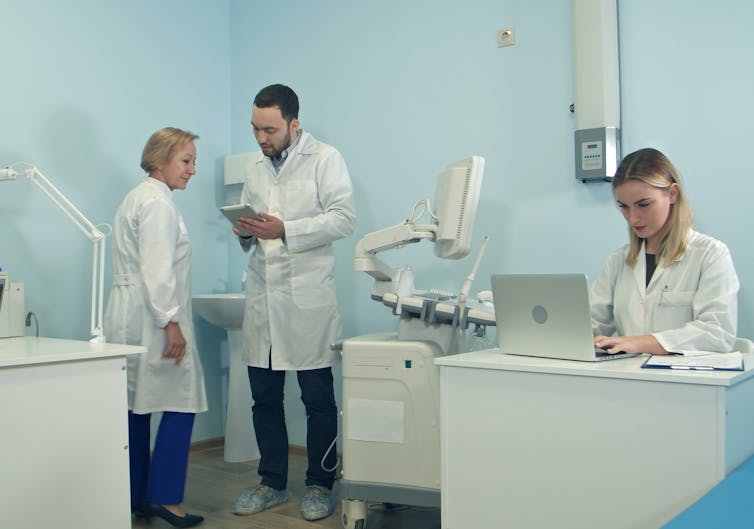Why your doctor may not be able to help you lose weight
We turn to doctors to treat cancer, addiction and high blood pressure. And, they have a lot of training and tools to help us. Why is that not so with obesity?

Obesity was designated a disease in 2013 by the American Heart Association and American Medical Association. Obesity, defined as a body mass index of 30 or higher, had long been identified as a health condition, but its designation as a disease underscored its role as a risk factor for leading causes of death, such as heart disease, Type 2 diabetes, stroke and many cancers.
Given that nearly 40 percent of Americans are obese, you might think that primary care physicians, the front line of medical care, would be actively engaged to help patients lose weight. Counseling on a healthier lifestyle has long been under the purview of the PCP.
The United States Preventive Services Task Force, an independent panel of experts, further solidified the physician’s role in engaging patients in weight loss efforts when it recommended in 2003 and again in 2012 that physicians should screen “all adults for obesity and offer or refer patients with a BMI of 30 kg/m2 to intensive, multicomponent behavioral interventions.”
Unfortunately for patients with obesity and our society, PCPs have been largely silent in their response to the obesity epidemic.
As a PCP myself, and a health researcher, I’ve studied how primary care has been engaged in helping our patients lose weight. Unfortunately, we’re not doing so great. Losing weight is difficult, and my studies suggest helping patients lose weight isn’t any easier.
High weight, low response
One of my studies revealed that only 6 percent of visits include counseling for weight, a decrease from 8 percent of visits during the prior decade.
Rates of counseling for diet and exercise have also decreased, with greater declines seen in patients with the most to benefit from healthy lifestyle change, including those with hypertension, diabetes, and obesity. Further, a small minority – 9 percent – of PCPs are performing the majority – at 52 percent – of all reported weight counseling. In addition, most PCPs – 58 percent – failed to perform any weight counseling during patient visits across study years.
There are real reasons PCPs have been less than engaged in counseling patients about weight loss. Physicians are pessimistic that patients can change, physicians have time limitations, and physicians’ training and skills for counseling are thought to be inadequate. Until recently, physicians weren’t reimbursed for time spent counseling, either.
Also, PCPs often do not have time due to an increasing number of clinical items, including diseases, medications, and tests, addressed during adult primary care visits. Further, doctors don’t have the tools.

It’s not because doctors aren’t capable but rather because few tools exist to help PCPs counsel patients. Weight loss programs within the primary care setting are relatively ineffective. Also, there are only a handful of prescription medications available to PCPs to prescribe, with several withdrawn from the market due to safety concerns. Multiple medications have recently been introduced to help with weight loss, although there is a known delay in prescribing uptake.
Patients pay attention to their doctors
Recent policy changes have attempted to overcome at least the barrier of lack of reimbursement for counseling. In 2012, Centers for Medicare and Medicaid implemented coverage for intensive behavioral therapy for obesity by PCPs. Further, the implementation of the Patient Protection and Affordable Care Act expanded this coverage to all adults by requiring health insurance carriers to cover this and other recommendations, at no expense to the patient.
This does not guarantee success, however. In fact, the medical community does not yet have data about whether Medicare and other insurer coverage of the intensive behavioral counseling benefit will actually help patients lose weight and maintain it.
Although the new reimbursment provides a structure and payment code for visit frequency, there remains a need to understand how best to implement such counseling within the primary care setting, even if studies show that counseling is effective. Further, a looming primary care shortage calls to question if a workforce will even be there to see current patients, much less add up to 20 additional visits for the one in three who have obesity.
But PCPs may be able to help patients address their weight in other ways. A study my colleagues and I did of national data found that patients who were overweight and obese were more likely to report successfully losing 5 percent of their body weight in the past year if their doctor had simply told them they were overweight.
Although barriers such as an awkwardness to even discussing a patient’s weight in the clinic remain, PCPs may be better equipped to provide this straightforward, yet powerful, information during a clinic visit.
This does not, however, address the need for effective weight loss programs following the identification of patients with obesity.
Changing our approach
Overall, despite the recognition of obesity as a chronic disease, we doctors still don’t treat it this way in the clinical setting. Clinically, if we do help patients engage in weight loss efforts, we then stand back and watch as they regain weight, and then try to re-engage them in additional weight loss efforts. Of patients who lose even 5 percent of their weight, our work has shown that 2 in 3 will regain weight within one year.
It’s important for us PCPs to start thinking about better approaches. We wouldn’t treat someone’s high blood pressure with a medication for only a year and then scratch our heads as to why their blood pressure is high again two years later.
Weight loss is incredibly difficult. Unlike smokers who are trying to quit and can just throw out their cigarettes, people with obesity can’t simply throw away all of their food. Patients with obesity need to identify a new relationship with food, and understand how to have a healthful diet, and not just a diet to help one lose weight.
PCPs have an important role in helping patients with obesity identify the need to lose weight and then make lifestyle changes in order to do so. We just need to find ways to better engage both PCPs and patients to avoid our silent response to this epidemic.
Jennifer Kraschnewski receives funding from Patient Centered Outcomes Research Institute (PCORI), National Institutes of Health, and Commonwealth of Pennsylvania Department of Health.
Read These Next
GLP-1 drugs may fight addiction across every major substance, according to a study of 600,000 people
GLP-1 drugs are the first medication to show promise for treating addiction to a wide range of substances.
Housing First helps people find permanent homes in Detroit − but HUD plans to divert funds to short-
Detroit’s homelessness response system could lose millions of dollars in federal funding for permanent…
Trauma patients recover faster when medical teams know each other well, new study finds
A new study from a Pittsburgh hospital finds that trauma patients recover faster when emergency medical…






